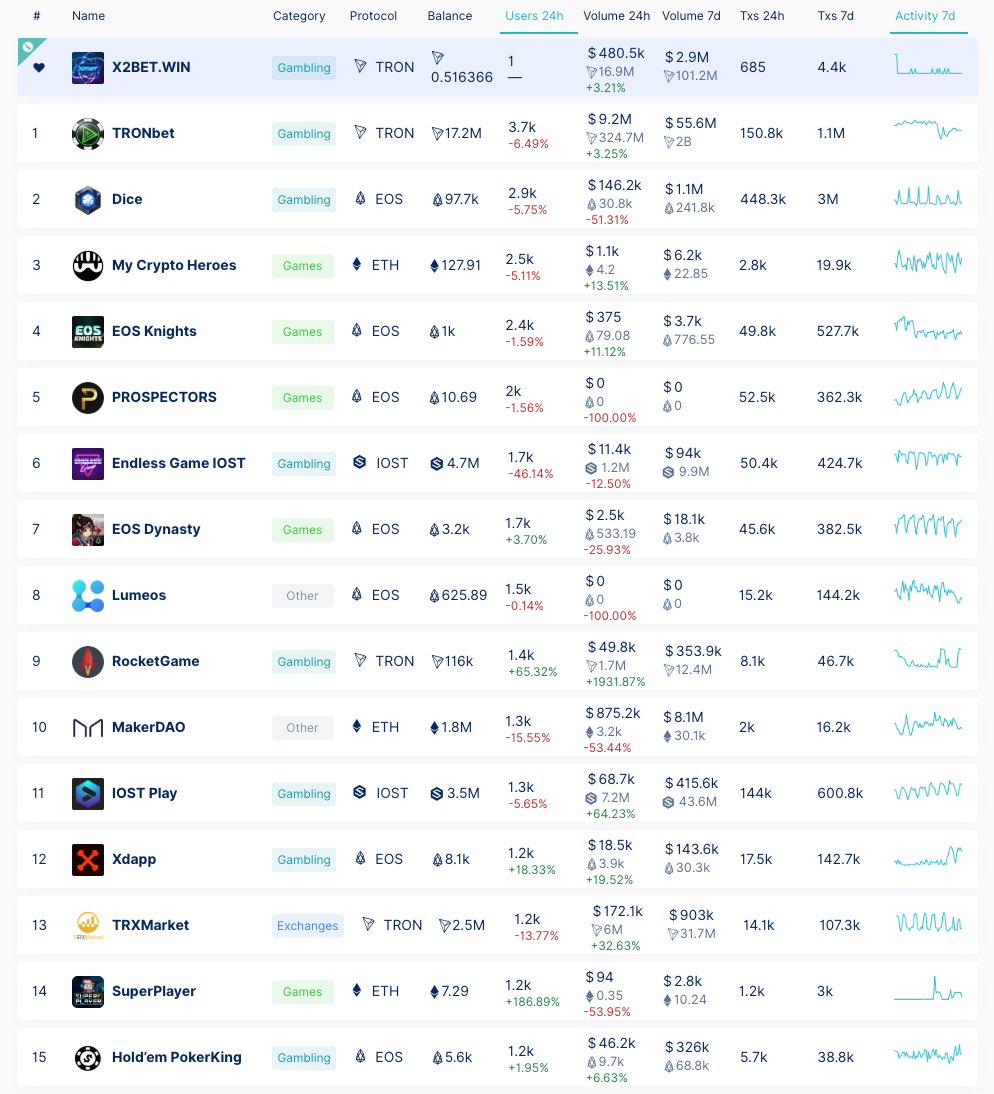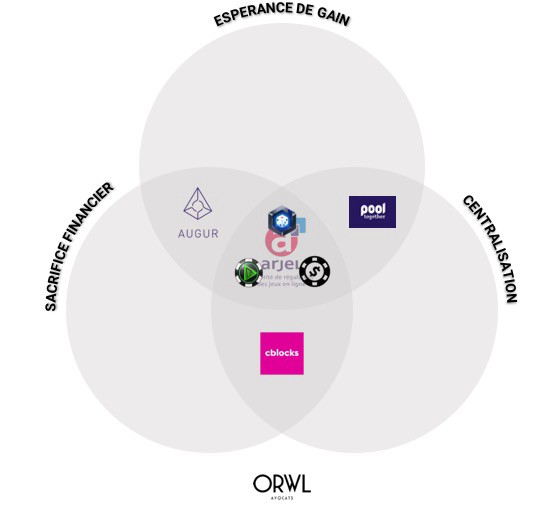
Cryptos and gambling : an impossible love ?
Cryptos are disrupting the online gambling market. Of the 15 most important Dapps, more than half are gambling applications, be it for sports betting like TRONbet, online casino like Dice, lotteries like PoolTogether or poker like PokerKing.

This is not surprising when one knows the size of the online gambling market ($525bn in 2023) and understands the technical opportunities offered by the blockchain in this context (micro-payment, automation of transactions, immutability, transparency, etc.).
In France, although the online gambling market was opened to competition in 2010, these activities remain particularly regulated by the ARJEL – whose powers will be strengthened – and scrutinised by Tracfin because of the risks of losses and addiction for the public and the close links historically maintained by the sector with crime and money laundering; risks that are equally highlighted in the cryptoassets regulation strategy.
Strict supervision of online games
Gambling is in principle prohibited in France as long as it meets the following three conditions.
Addressing the public
This first condition is systematically met in the case of an Internet site, except if the site is only accessible to a very limited circle of individuals.
To fall within the scope of the regulation 🇫🇷, the site must be accessible from France. As it is technically impossible to block all French users completely, the judges use a range of indicators to determine whether the offer is addressed to French users: use of the French language, payment in euros accepted, no disclaimer in the T&Cs, no IP blocking, etc.
Offering an expectation of profit due to chance
The condition of chance makes it possible to exclude transactions in which the amount of the gains is known in advance (for example, an investment in Bitcoin which is certainly motivated by the expectation of a gain but where the consideration is the delivery of Bitcoin whose value at the time of purchase is known in advance).
The gain condition is understood in a broad sense. It obviously refers to gains of money but also to gains in kind, notably through the handing over of a good, such as a crypto-active, as soon as it is “likely to give rise to monetisation, i.e. to be sold”.
Involving a financial sacrifice
While the concept seems simple in cases where gambling is paid for – as in the case of lotteries, poker or scratch games – new uses are leading the regulator to re-examine it.
Indeed, the courts have already ruled that the delivery of property constitutes a financial sacrifice (i.e. the delivery of cryptos) and the ARJEL recently considered that the simple fact of granting access to one’s personal data to gambling, although free of charge, could be considered as a financial sacrifice. However, this interpretation has not yet been validated by a judge.
For the provision of a service meeting these three criteria, an license is required. To date, only about fifteen actors have been approved by the ARJEL following a particularly demanding and costly procedure which is unthinkable for a young project. The fact of having an approval abroad – most of the time in Curaçao or Malta – does not make it possible to operate on the French market.
Moreover, the taxation of these players is prohibitive since it is a flat-rate levy on the sums bet by users of 5.7% for sports betting and 1.8% for casino games. In concrete terms, an operator who makes no profit still has to pay significant tax.
Finally, the very precise technical requirements to which the platforms must adhere seem unsuitable for the use of a blockchain.
The current framework is therefore a major obstacle to the development of new players combining games and cryptos. However, the use of cryptos allows the emergence of new uses that may escape this regulation.
Technical innovations and legal opportunities offered by cryptos
The law is generally neutral with regard to the technology used: paper, digital, blockchain, etc. Uses are regulated, not the technical means to achieve them.
« A bitcoin poker game is still a prohibited poker game. A bookmarker placing bets on a blockchain remains the organiser of prohibited bets. »
Moreover, the concepts underlying the prohibition of gambling, such as financial sacrifice or expectation of winnings, are particularly vague and the regulatory authority, supported by politicians, adopts a very broad interpretation of them in the name of the imperative of protecting the players.
Most online games based on crypto or using a blockchain are therefore fully subject to the applicable regulations and therefore risk, in the absence of authorisation, the blocking of their website in France, the freezing of their assets and the imposition of fines and imprisonment.
However, certain new uses created by these technologies make it possible to deviate from the scope of these regulations by overturning their application criteria :
The notion of financial sacrifice
Micro-payments and lending make it possible to reconsider the notion of financial sacrifice.
For example, the PoolTogether project is developing a “loss-free lottery”: tickets are bought in DAI (a stablecoin backed by ether), the collected DAI are lent on Compound, the interest is paid to the winners and the other participants get their stake back.
In principle, it can therefore be estimated that there is no financial sacrifice since the participants get back the amount they have bet. However, this type of service is not totally immune to an extensive interpretation which would lead to the view that the interest, to which the participants would have been entitled if they had not participated, constitutes a financial sacrifice.
However, there are many arguments against this analysis, and there is little doubt that this type of lottery will win significant traction.
The notion of profit expectation
The intellectual appeal and the multiplication of cryptos make it possible to reconsider the notion of profit expectations.
The Cblocks project proposes a kind of loot box of cryptos. The user buys a portfolio at a given value and receives a basket of 5 different cryptos chosen from the first 300 listed by CoinMarketCap.
The ARJEL has already taken up a position itself on the treatment of loot boxes – which consist of receiving indeterminate batches at random – and has deemed them to be a gambling game as long as they are paid for and allow a random win of a monetisable object.
However, in the case of Cblocks, the uncertainty lies in the nature of the goods and not in their value. However, one cannot consider that there is an expectation of gain as long as the counterpart of the financial sacrifice is equivalent to the latter. This type of service should therefore not fall within the scope of the prohibition unless it is considered that the gain lies in the potential return on each of the cryptos.
Control capacity
The decentralised nature and smart contracts make it possible to run incensurable applications and challenge the regulator’s control capacity.
The Augur project, a decentralised platform for predictive markets, thus offers its users the possibility of opening a bet on the realisation of a subsequent event that can be taken by any other user.
The service seems to respond to all the characteristic features of a gambling game.
However, it could be pointed out that the financial sacrifice has as its direct counterpart the obtaining of a REP token and not the hope of a gain which is only incidental, as one would buy a share in the hope that its value will increase.
In any case, the decentralised nature of the project makes it difficult for the regulator to determine liability and control.
* * *
Cryptos therefore represent a real challenge for the gambling sector. Indeed, the blockchain presents interesting technical opportunities in terms of gambling, which cannot however be exploited because of the legal constraints specified. Some projects will be able to implement new solutions and benefit for a while from a legal loophole.
But it is highly unlikely that the ARJEL will react as favourably as the AMF to the development of new financial uses for the blockchain (ICOs).
For the time being, health protection and anti-money laundering imperatives justify particularly strict supervision of these activities, which has led to the establishment of an oligopoly.
The contribution of cryptos to gambling will therefore certainly not lead to a break-up of the sector but will probably profit to market players.





